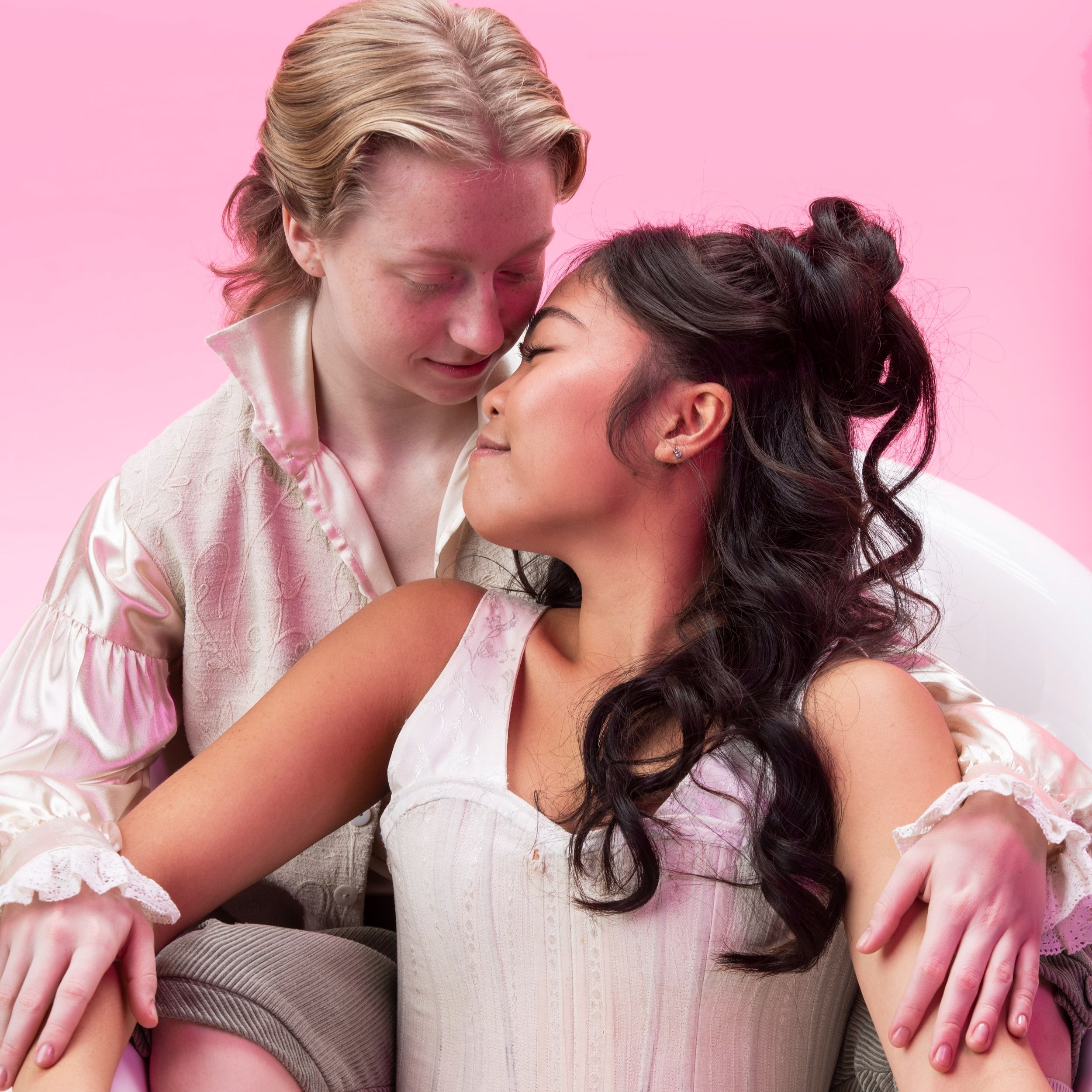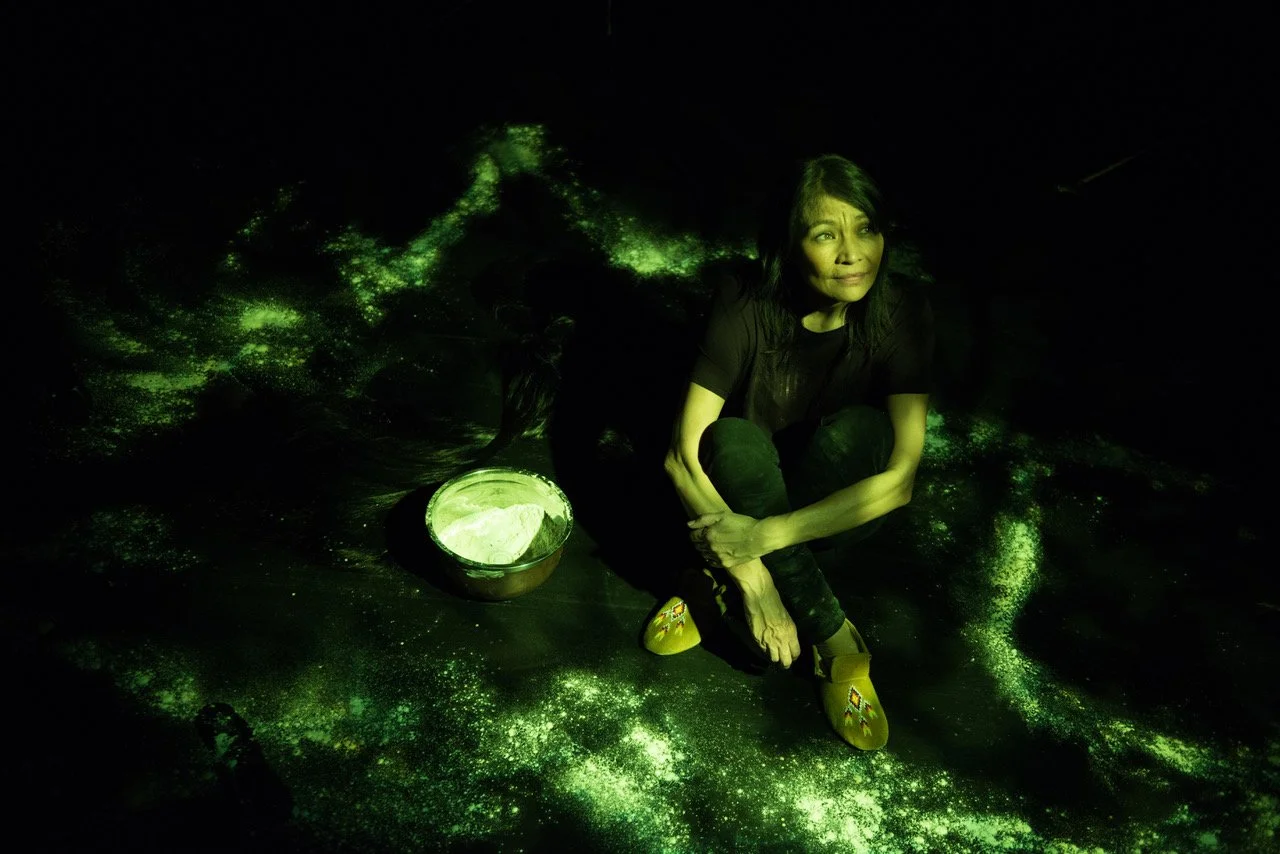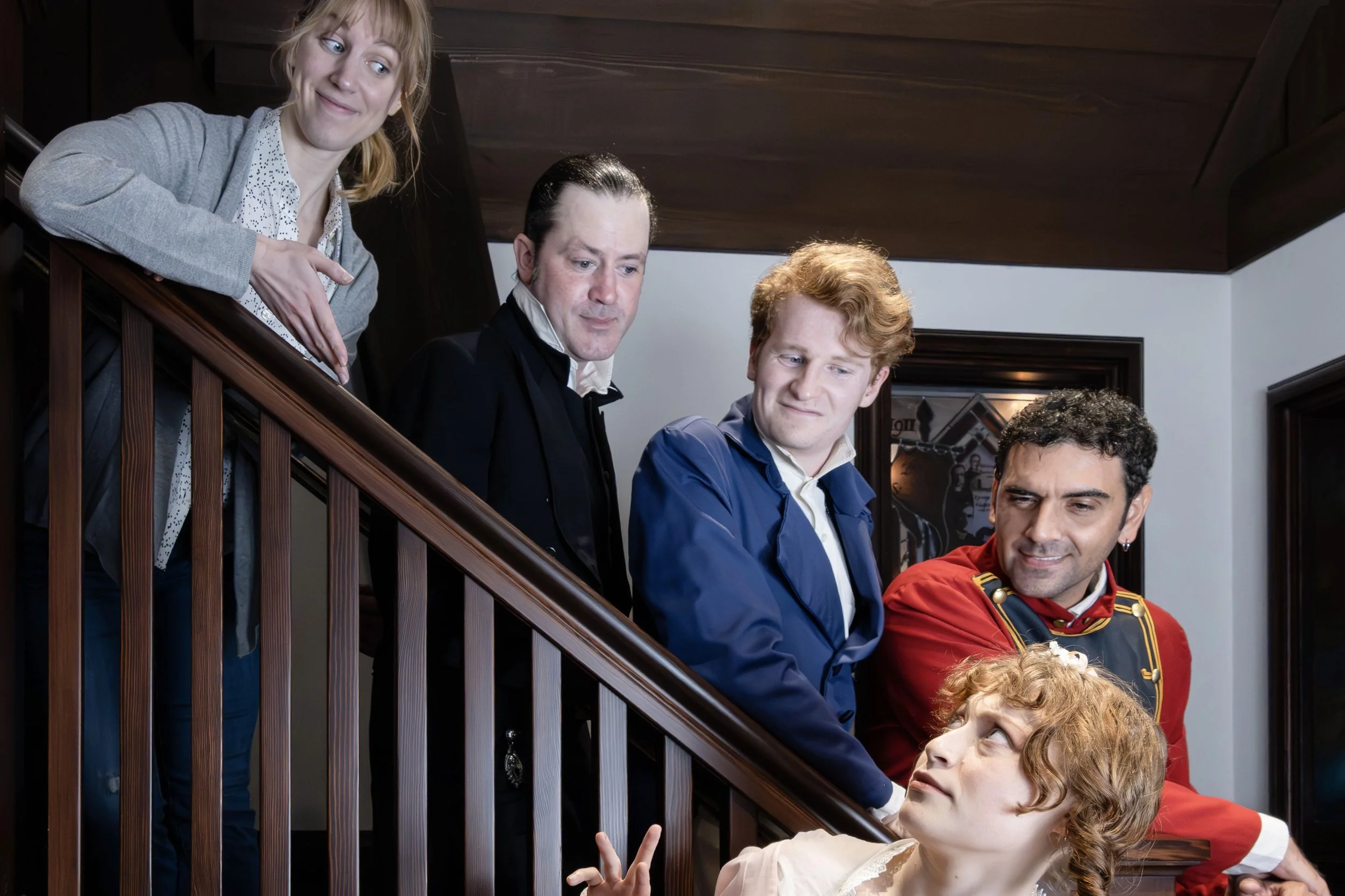Theatre review: Linck & Mülhahn asserts a boldly realized story of glitzy rebellion
Studio 58 production features strong performances and striking visuals in true story of love, lust, and gender identity in rigid 18th-century society

Lucy Jeffery (left) as Anastasius Linck and Yorlene Bernido as Catharina Mülhahn in Linck & Mülhahn. Photo by Emily Cooper
Studio 58 presents Linck & Mülhahn to December 1
AT ONE POINT in Linck & Mülhahn, Anastasius Linck explains the significance of his name, taken from St. Anastasius and meaning “resurrection”. It’s a name he chose, not one he was given—an act of defiance for someone who had to rebuild himself time and again in a world intent on erasing him.
The play mirrors this spirit of rebirth, bringing to life the real story of Anastasius and his wife, Catharina Mülhahn, a couple who lived and loved in 18th-century Prussia, a time and place that refused to acknowledge them. With care and deliberate craft, Studio 58’s production of Ruby Thomas’s drama, directed by Angelica Schwartz, brings their love story back into the light—tender and joyful.
From the start, it’s obvious this isn’t a straightforward period drama. Colourful lights flicker and dance as an older Catharina (Kathryn Kerby the night I saw the play) steps onto the stage, narrating her own story with a sense of urgency, like she can no longer hold off on telling it. Split-staging pulls us in right away, letting the action unfold with her words. Before Catharina and Anastasius first meet, this staging gives us a glimpse into their separate lives: while Anastasius (a charmingly cocky Lucy Jeffery) has his hands full under a girl’s skirt at a ball, the young and rebellious Catharina (a spirited Yorlene Bernido) is hidden away in a pantry, turning pages—and turning herself on. The sexuality on display here, and throughout the play, is intimate and unapologetic, anchoring the protagonists’ connection in a freedom that goes beyond the physical.
That shared longing for freedom runs spiritedly through the first half of the play. The couple meet when Anastasius, having deserted the army to avoid undergoing a physical exam that would reveal his assigned sex at birth, adopts a new identity as an apprentice tailor. Catharina crosses his path while begrudgingly following her mother’s demand to buy a dress that might help land her a suitor. What follows is banter-heavy courting, and after some trepidation from Anastasius, a resolute “fuck it, let’s get married.” Their wedding takes place under the glow of a pink-neon cross, with a chamber rendition of Mitski’s “My Love Mine All Mine” playing along the way. Needless to say, the tongue is firmly—and anachronistically—planted in cheek.
The tenderness is wholehearted, however, helped along by both Jeffery’s and Bernido’s sensitivity and chemistry. Anastasius cooks and scrubs while Catharina reads philosophy and writes, hoping to sell her work and contribute to their home—a bright pink sanctuary framed by lifelike roses that pop against the painted ones elsewhere on the set. It’s a thoughtful touch in Starlynn Chen’s bold set design, developed under the mentorship of Brian G. Ball. In this haven, Catharina, hair loose and dressed in bloomers, giggles as she tells her husband, “We are repulsive!” poking fun at their lovey-doveyness.
At the same time, right beside them is a constant reminder of a starker reality; a suffocating sitting room, haunted by the ticking of an unrelenting grandfather clock, where Catharina’s mother (a commanding and also well-timed Michelle Avila Navarro) ruminates over her fears of what life married to Anastasius might mean for her daughter.
Thanks to parental meddling, the second half of the play pivots to the courtroom. The set strips away the vibrancy of the marital home, replacing it with bare, unfeeling walls. Even here, the play never lets go of its playful undercurrent, though. The surrealism and stuffiness of the courtroom are heightened by the exaggerated makeup and wigs of the judges, one of whom constantly falls asleep mid-trial. The men tasked with enforcing the rigid and inhumane laws of 18th-century Prussia can’t even fathom how the couple could possibly be sexually intimate, and a major point of debate becomes whether Anastasius should be tried as a man or a woman. The ignorance is both comic and tragic.
The humour risks feeling a bit stretched during this section, considering the stakes, but the play handles the shifts in tone thoughtfully. The ending especially soars, giving us one last visual treat amid the show’s distinctive Bridgerton-esque aesthetic.
In the end, despite the actual events that brought too soon an end to a tender love story, Linck & Mülhahn lingers not as a story of defeat, but as a glitzy rebellion—and a reminder that telling the story in its own way is its own kind of triumph. ![]()
Angie Rico (she/her) is a Mexican-born cultural worker, currently living and working in so-called Vancouver. She is a graduate from Emily Carr University and past participant of Neworld Theatre’s Critical Futures training program. She's the recipient of the 2023 Max Wyman Mentee Award in Critical Writing. Her writing covers film, visual arts, and theatre.
Related Articles
Aussie troupe Gravity & Other Myths’ stripped-down spectacle has been a hit around the world
In Hair Hair Everywhere, Shabnam debates whether or not she should shave
In girl power–fuelled show, performers channel sounds of Beyoncé, Lily Allen, and more in turning the tables on doomed relationships
In Inner Elder at the Firehall Arts Centre, the Calgary-based theatre veteran draws on more than three decades of Indigenous clowning experience
Moving into ambitious new territory, the company meets the many challenges of the Broadway classic and its still-relevant message
Arts Club play edges true-life story of Princess Di hospice visit into unexpected transcendent realm
All is not as it seems as two of Shakespeare’s most tumultuous couples navigate secret love and mistaken identities
With its flared costumes and feisty performances, Metro Theatre’s production of a Rice and Lloyd Webber favourite offers a quirkily fun tour of musical genres
As storylines switch between playwrights and the characters they’ve created, this challenging Zee Zee Theatre production spotlights hidden disparities separating two best friends
Fast-rising Filipino-Canadian actor and singer-songwriter takes the titular role in a rendition set in a 1970s variety show
The transition follows her departure from Music on Main, where she served as artistic planning and operations manager for seven years
Playwright Katherine Gauthier’s fly-on-the-wall production at Pacific Theatre follows five people in a group therapy session as they exchange intimate thoughts
City council throws support behind feasibility study’s call for world-class mid-size venue and recital hall
Wild treadmill antics, nostalgic-’90s circus, and new work by the likes of Corey Payette, Carmen Aguirre, Anais West, Veda Hille, and Maiko Yamamoto
Zahida Rahemtulla’s new play reflects three versions of what it meant to hold things together during the 2016 refugee resettlement initiative
Western Gold Theatre finds unique paths through the mysteries of Caryl Churchill’s innovative play on aging and dying
At Progress Lab 1422, a pair of tracks feature multidisciplinary works by Howard Dai, Paige Louter, Cameron Peal, and more
Roster also includes the troupe’s 40th panto, Jack and the Beanstalk, plus Neil Simon, Lend Me a Tenor, Shakespeare in Love, and more
Ten episodes feature play excerpts and interviews with emerging theatre artists who identify with D/disability
Annual accolade honours an individual who has significantly enriched Metro Vancouver’s arts and culture community
Seventy years after the classic musical’s debut, its theme of love transcending hate continues to inspire performers and audiences
Offerings at The Cultch span coming-of-age stories, puppetry, musical theatre, and more
The journey through Cree artist’s real-life memories follows a young Indigenous girl growing up in Alberta
The offbeat logic of being a kid gets tangled up with adult social dynamics in Clare Barron’s acclaimed play
Director Andrew Kushnir says Nick Green’s play also highlights the key role of the Princess of Wales in destigmatizing contact with patients
Driven by humour and Dolly Parton tunes, Royal City Musical Theatre’s inspired take on ’70s-era office politics is boldly relevant
At The Cultch, the politically pointed show interweaves songs, storytelling, and satire in a battle cry for Asian femmes
Valerie Methot says new play takes place in the near future, following an apocalyptic storm
Codirectors Cameron Mackenzie and Diane Roberts unpack the story of two friends struggling with political differences after the Black Lives Matter protest at a Toronto Pride Parade
At Vital Spark Theatre, Joan Bryans directs the adaptation that explores what could happen if the characters decide their own fates
































